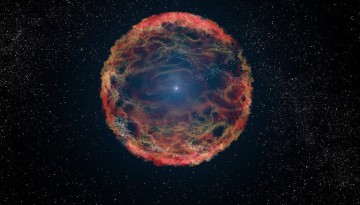Cornell University astronomer chosen by NASA for ULTRASAT observatory
NASA has selected 14 U.S.-based researchers to join the Ultraviolet Transient Astronomy Satellite (ULTRASAT) science team, among them Anna Y. Q. Ho, assistant professor of astronomy in the College of Arts and Sciences. She has also been appointed co-chair of the gamma ray bursts working group.
Artist’s impression of supernova 1993J, an exploding star in the galaxy M81 whose light reached us 21 years ago. ESA/Hubble
Ho and the others chosen will pursue science investigations that will contribute to Israel’s first space telescope mission, planned to launch into geostationary orbit around Earth in 2026.
ULTRASAT will be an ultraviolet (UV) observatory with a 204-square-degree field of view, which is dramatically larger than the other operating UV satellites. It will investigate the secrets of short-duration events in the universe such as tidal disruption events, supernova explosions, and mergers of neutron stars in binary systems.
“ULTRASAT will enable us to answer several longstanding questions in the field through the discovery of long-hypothesized phenomena, the routine discovery of mysterious and rare classes of sources, and the unique physical information that only detailed UV light curves can provide,” said Ho.

